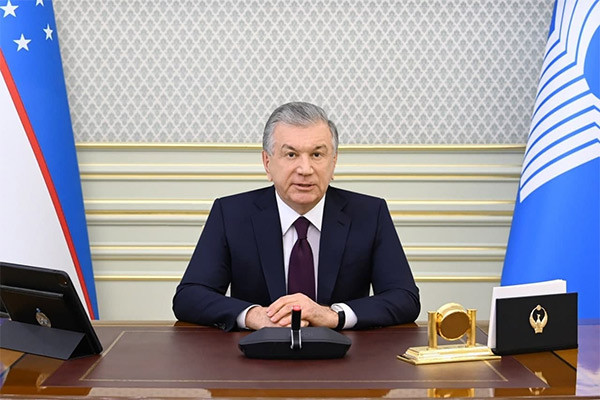On 15 October, President of the Republic of Uzbekistan Shavkat Mirziyoyev attended the CIS Heads of State Council meeting via videoconference.
The summit, chaired by the President of the Republic of Belarus Alexander Lukashenko, was also attended by the President of the Republic of Azerbaijan Ilham Aliyev, Prime Minister of the Republic of Armenia Nikol Pashinyan, President of the Republic of Kazakhstan Kassym-Jomart Tokayev, President of the Kyrgyz Republic Sadyr Zhaparov, Prime Minister of the Republic of Moldova Natalia Gavrilița, President of the Russian Federation Vladimir Putin, President of the Republic of Tajikistan Emomali Rahmon, President of Turkmenistan Gurbanguly Berdimuhamedov, Chairman of the Executive Committee – Executive Secretary of the CIS Sergey Lebedev.
Following the agenda, the heads of delegations exchanged views on the development and achievements of multilateral cooperation over the 30 years of the Organization’s activity, considered issues of further expansion of interaction in the economic, legal and cultural-humanitarian spheres, as well as in combating modern challenges and threats to security and stability in the region.
In his speech, the Head of the state presented a vision of key areas for strengthening partnership within the CIS.
The importance of ensuring sustainable economic growth in the CIS countries was highlighted.
In the context of the consequences of the pandemic, the positive dynamics of trade-economic cooperation remain. Thus, since the beginning of this year, the volume of bilateral trade between Uzbekistan and CIS partners has increased by almost a third. At the same time, both quantitative and qualitative growth of trade turnover indicators is observed.
At the same time, the need for the full functioning of free trade zone in the Commonwealth space without exceptions and restrictions was emphasized. In this regard, it is proposed to prepare recommendations on further liberalization of trade policy within the framework of the Association based on a comprehensive analysis.
The President of Uzbekistan proposed to identify the development of industrial cooperation as a key issue on the economic agenda in the CIS in 2022 to comprehensively support joint projects and establish long-term business contacts.
Currently, at the initiative of the Uzbek side, an appropriate long-term cooperation program is being prepared. Next year, Uzbekistan will host a forum and exhibition of industrial cooperation of the Commonwealth.
The Head of the state focused on the need to further develop the system of effective interregional and transcontinental transport corridors, including by reducing tariffs and simplifying cargo transportation procedures.
Uzbekistan also stands for the active promotion of joint innovative programs and supporting startup projects involving young entrepreneurs. An initiative has been put forward to develop a program of cooperation between technology and IT parks in the Commonwealth countries.
The importance of strengthening the activities of the CIS Economic Council by involving representatives of business circles and regions of the countries in its work was also noted.
In addition, special attention was paid to the issues of countering climate change and promoting the green agenda, consolidating efforts to ensure biosafety, improving the labor market, as well as restoring mutual tourist flow and enhancing cultural-humanitarian exchange.
Speaking about the situation in Afghanistan, the President of Uzbekistan stressed the expediency of continuing to provide humanitarian and economic assistance to the Afghan people.
The need for strengthening cooperation in the fight against terrorism and drug trafficking was also noted.
In conclusion, the Head of the state confirmed Uzbekistan’s firm commitment to continuing constructive dialogue and close cooperation to achieve concrete results of partnership for the benefit of friendly peoples of the CIS countries.
Following the summit, statements were adopted in connection with the 30th anniversary of the Organization, on cooperation in biosafety, migration, an agreement on the establishment of the Council of Chairmen of the Supreme Courts and several other important documents on various areas of multilateral cooperation.







